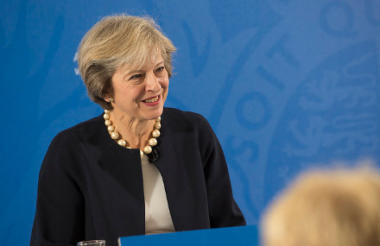Having finished last year despairing at the events of 2016, a new year brings new hope. Not because global politics looks any more stable, but because for the charity sector at least, we are hearing warmer noises from government than we have for some time.
The Charity Commission’s annual public meeting was honoured by the presence of no less than the Prime Minister Theresa May, who gave her vision for a “shared society”. This, she said, involves “creating an environment in which our charities and social enterprises can thrive”.
OK, so talk is cheap, and some of the more tangible themes, such as supporting the National Citizen Service and social finance, are all too familiar. But at least the charity sector now has a narrative within government that has been absent since the big society was shuffled off into obscurity.
And there have been some concrete developments. Number Ten has set up a new policy unit to improve the government’s relationship with charities. A crown representative for the voluntary sector is also to be appointed, filling a post that has been vacant since 2014. Not to mention a new “place-based public service incubator”, which will seek to overcome barriers to smaller charities winning public contracts.
Meanwhile, the hated “anti-advocacy clause”, which sought to prevent charities which receive public funding from doing anything that might be construed as lobbying, has been scrapped. In its place, a new government grants standard has the potential to stamp out the sort of loose practice seen in relation to Kids Company and the distribution of Libor fine revenue.
All of this should, of course, be taken with a large pinch of salt. There is much more to be done if the charity sector is to feel like a truly valued partner of government. Funding remains constrained, with grants particularly thin on the ground.
However, the number of policies that have been overhauled across government more generally since May became PM suggests a genuine turning of the page, and an opportunity for charities to restate their value.
At the very least, it is refreshing to have something to be optimistic about, even if it proves to be short-lived.
Looking ahead
It was once suggested to me that the biggest difference between a financial controller and a finance director is that the former looks at the numbers in the past and the present, while the latter looks at those in the future. It is on this basis that the theme of this month’s issue is “the future”, with six charity sector experts giving their views on what lies in store.
There are clearly big challenges ahead, but one of the messages that comes through is how resilient the charity sector is.
This is exemplified by the fact that William Beveridge, the architect of the modern welfare state, worried in 1948 that the changes he had inspired would impinge on the “vigour and abundance” of voluntary action. In the event, the sector adapted in order to provide a valuable supplement to state action.
Charities of today and the future face catering for an ageing population, at a time when climate change causes upheaval in the environment and ecosystem, and artificial intelligence renders many jobs obsolete.
Yet the need for charities will always exist, and so will the funding (to a greater or lesser degree). The only question is how quickly the sector will make the adaptations that are required.









